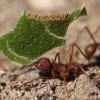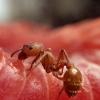Can ants survive a nuclear war like roaches would?
- Formiculture.com
- Forums
- Gallery
- Members
- Member Map
- Chat
Can ants survive a nuclear war like roaches would?
Do you *really* want to know the answer to that?Can ants survive a nuclear war like roaches would?
There are certainly big mega mutant ants in Chernobyl.
Roaches, despite their reputation as survival artists, are actually much more susceptible to radiation than you'd expect.
We should respect all forms of consciousness. The body is just a vessel, a mere hull.
Welcome to Lazy Tube - My Camponotus Journal
Quick reminder that modern nuclear and hydrogen bombs are MUCH more powerful than the first warheads developed in WW2. The biggest of them can set trees ablaze in a radius of around 100km around the impact site. And we're not even talking stuff like MIRV warheads (basically a nuke shotgun shell) here.
Edited by Serafine, October 3 2022 - 2:50 AM.
We should respect all forms of consciousness. The body is just a vessel, a mere hull.
Welcome to Lazy Tube - My Camponotus Journal
Edited by Jonathan5608, October 3 2022 - 3:07 AM.
Quick reminder that modern nuclear and hydrogen bombs are MUCH more powerful than the first warheads developed in WW2. The biggest of them can set trees ablaze in a radius of around 100km around the impact site. And we're not even talking stuff like MIRV warheads (basically a nuke shotgun shell) here.
I honestly don’t think anything would survive if we have a nuclear war now. Especially with the technology we have today
Yeah, I forgot to tag this sort of thing on last night. I'm not sure what the radiation levels are from modern nuclear weapons, but I'd assume pretty much everything would die if modern weapons were used (either from the ridiculously powerful blast/heat waves or from the radiation). I won't get into the nitty-gritty, but the ants would need a huge amount of luck to be sheltered enough to survive modern weapons. So, a decent chance of surviving when relatively low payload bombs are used, but if high payload bombs are used, I'd assume pretty much everything would die.
Based on the bombs used on Nagasaki and Hiroshima and on how much gamma radiation it takes to render a number of different ant species completely infertile*, assuming that they’re not more susceptible to being killed by neutrons, beta radiation, etc. (the numerous other unpleasant, indirect effects of nuclear bombs), and assuming that they were not killed directly or indirectly by the blast/heat of the blast itself, I would guess (guess being the keyword here) that ants would survive as long as they were approximately 0.8km or more (unsheltered) from the hypocenter (ground zero) of the bomb** (of course, the further from the hypocenter the more likely they are to survive). The fact that the ants would most likely be sheltered deep underground in their nests would probably help them survive the overpressure and heat wave of the initial blast, otherwise these would probably stand a good chance of killing them.
However, that just means that ants ~0.8km+ from the hypocenter would likely survive the initial dangers of a nuclear attack. There’s still a very real chance that the after effects - such as the nuclear fallout and potential black rain, which could essentially poison them, their food, their nest, their water, etc. - would kill them. It would really depend on how exposed they are to these after effects, and on how high the radiation levels of the fallout they would be exposed to are. If the levels are within a manageable range (i.e. if the irradiated debris came from relatively far away from the hypocenter), then they’d probably survive. If the fallout is from close to the hypocenter, however, they’d probably die.
So, it would probably depend on a bit of luck (distance from the blast, fallout, the weather, etc.), but there’s likely a decent chance ants would survive a nuclear war.
* https://academic.oup.../6/2348/2631638
** https://www.rerf.or....raditiondose_e/
Solenopsis molesta group and Labidus coecus could probably make it since they're underground ants.
well evolutionarily all the major extant subfamilies were already existent in the mid-late Cretaceous and survived the K-Pg extinction event and then began a rapid diversification during the Paleocene- Eocene-Oligocene, I would think, yes, they are survivors.
@NicholasP Most species of ants are underground? Something tells me you don't understand nuclear power. Even if the ants survived underground, when they emerged they would die. Not to mention their environment and food sources would be screwed along with their potential to mate.
I know that lol. I've been keeping for 3 years I think I know that. Solenopsis molesta group ants though are entirely subterranean living unlike normal ants where normal ants forage above ground. It's entirely possible for ants to evolve for colonies just to find each other and mate. Look at the frogs in Chernobyl they evolved very quickly to a black color to survive the radiation.
Considering that at the end of the cretatious period Earth was apparently hit by two megaton asteroids and most animal groups still made it through chances a nuclear war exterminates all higher life on Earth are VERY slim.
Nothing we can do to Earth can be as bad as having a few billion tons of rock impacting at several 10.000 kilometers per hour.
We should respect all forms of consciousness. The body is just a vessel, a mere hull.
Welcome to Lazy Tube - My Camponotus Journal
Also, nuclear bombs launched does not equal nuclear bombs that land. We had a lot of money put into space lasers (and many other defensive measures) for a reason. ![]()
Hi there! I went on a 6 month or so hiatus, in part due, and in part cause of the death of my colonies.
However, I went back to the Sierras, and restarted my collection, which is now as follows:
Aphaenogaster uinta, Camponotus vicinus, Camponotus modoc, Formica cf. aserva, Formica cf. micropthalma, Formica cf. manni, Formica subpolita, Formica cf. subaenescens, Lasius americanus, Manica invidia, Pogonomyrmex salinus, Pogonomyrmex sp. 1, Solenopsis validiuscula, & Solenopsis sp. 3 (new Sierra variant).
What? No there isn't. Where did you find that?
There are certainly big mega mutant ants in Chernobyl.
Ant Keeping →
General Ant Keeping →
Care guide for Pachycondyla Harpax?Started by Moldy_Leafcutter , May 15 2025 |
|

|
||
Ant Keeping →
General Ant Keeping →
How to Professionally Heat my Ants?Started by Entomologyants , Mar 25 2025 |
|

|
||
Ant Keeping →
General Ant Keeping →
What just happened here? Tetramorium immigransStarted by Stubyvast , Feb 16 2025 |
|

|
||
Ant Keeping →
Ant Keeping Journals →
bmb1bee's Cryptic Colonies (updated 17 Feb. 2025)Started by bmb1bee , Dec 2 2024 |
|

|
||
Anting →
Ant ID Requests →
ID wantedStarted by cooIboyJ , Oct 1 2024 |
|

|
0 members, 1 guests, 0 anonymous users